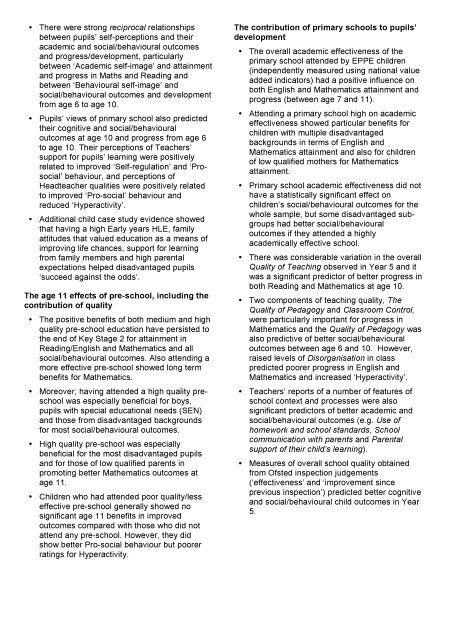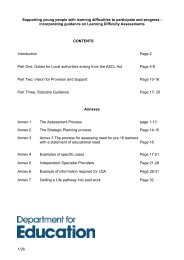Research Brief - Department for Education
Research Brief - Department for Education
Research Brief - Department for Education
You also want an ePaper? Increase the reach of your titles
YUMPU automatically turns print PDFs into web optimized ePapers that Google loves.
• There were strong reciprocal relationships<br />
between pupils’ self-perceptions and their<br />
academic and social/behavioural outcomes<br />
and progress/development, particularly<br />
between ‘Academic self-image’ and attainment<br />
and progress in Maths and Reading and<br />
between ‘Behavioural self-image’ and<br />
social/behavioural outcomes and development<br />
from age 6 to age 10.<br />
• Pupils’ views of primary school also predicted<br />
their cognitive and social/behavioural<br />
outcomes at age 10 and progress from age 6<br />
to age 10. Their perceptions of Teachers’<br />
support <strong>for</strong> pupils’ learning were positively<br />
related to improved ‘Self-regulation’ and ‘Prosocial’<br />
behaviour, and perceptions of<br />
Headteacher qualities were positively related<br />
to improved ‘Pro-social’ behaviour and<br />
reduced ‘Hyperactivity’.<br />
• Additional child case study evidence showed<br />
that having a high Early years HLE, family<br />
attitudes that valued education as a means of<br />
improving life chances, support <strong>for</strong> learning<br />
from family members and high parental<br />
expectations helped disadvantaged pupils<br />
‘succeed against the odds’.<br />
The age 11 effects of pre-school, including the<br />
contribution of quality<br />
• The positive benefits of both medium and high<br />
quality pre-school education have persisted to<br />
the end of Key Stage 2 <strong>for</strong> attainment in<br />
Reading/English and Mathematics and all<br />
social/behavioural outcomes. Also attending a<br />
more effective pre-school showed long term<br />
benefits <strong>for</strong> Mathematics.<br />
• Moreover, having attended a high quality preschool<br />
was especially beneficial <strong>for</strong> boys,<br />
pupils with special educational needs (SEN)<br />
and those from disadvantaged backgrounds<br />
<strong>for</strong> most social/behavioural outcomes.<br />
• High quality pre-school was especially<br />
beneficial <strong>for</strong> the most disadvantaged pupils<br />
and <strong>for</strong> those of low qualified parents in<br />
promoting better Mathematics outcomes at<br />
age 11.<br />
• Children who had attended poor quality/less<br />
effective pre-school generally showed no<br />
significant age 11 benefits in improved<br />
outcomes compared with those who did not<br />
attend any pre-school. However, they did<br />
show better Pro-social behaviour but poorer<br />
ratings <strong>for</strong> Hyperactivity.<br />
The contribution of primary schools to pupils’<br />
development<br />
• The overall academic effectiveness of the<br />
primary school attended by EPPE children<br />
(independently measured using national value<br />
added indicators) had a positive influence on<br />
both English and Mathematics attainment and<br />
progress (between age 7 and 11).<br />
• Attending a primary school high on academic<br />
effectiveness showed particular benefits <strong>for</strong><br />
children with multiple disadvantaged<br />
backgrounds in terms of English and<br />
Mathematics attainment and also <strong>for</strong> children<br />
of low qualified mothers <strong>for</strong> Mathematics<br />
attainment.<br />
• Primary school academic effectiveness did not<br />
have a statistically significant effect on<br />
children’s social/behavioural outcomes <strong>for</strong> the<br />
whole sample, but some disadvantaged subgroups<br />
had better social/behavioural<br />
outcomes if they attended a highly<br />
academically effective school.<br />
• There was considerable variation in the overall<br />
Quality of Teaching observed in Year 5 and it<br />
was a significant predictor of better progress in<br />
both Reading and Mathematics at age 10.<br />
• Two components of teaching quality, The<br />
Quality of Pedagogy and Classroom Control,<br />
were particularly important <strong>for</strong> progress in<br />
Mathematics and the Quality of Pedagogy was<br />
also predictive of better social/behavioural<br />
outcomes between age 6 and 10. However,<br />
raised levels of Disorganisation in class<br />
predicted poorer progress in English and<br />
Mathematics and increased ‘Hyperactivity’.<br />
• Teachers’ reports of a number of features of<br />
school context and processes were also<br />
significant predictors of better academic and<br />
social/behavioural outcomes (e.g. Use of<br />
homework and school standards, School<br />
communication with parents and Parental<br />
support of their child’s learning).<br />
• Measures of overall school quality obtained<br />
from Ofsted inspection judgements<br />
(‘effectiveness’ and ‘improvement since<br />
previous inspection’) predicted better cognitive<br />
and social/behavioural child outcomes in Year<br />
5.
















